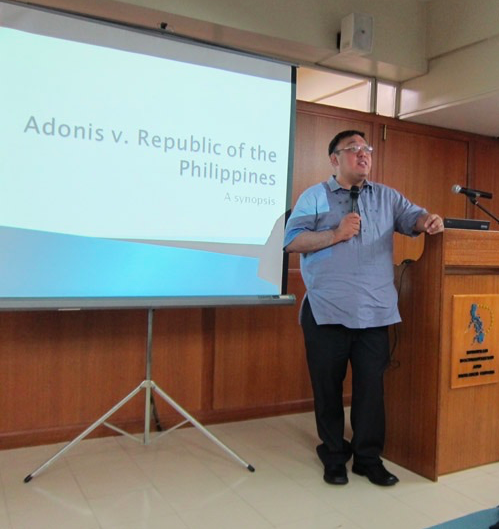Is it time to decriminalize libel? (Part 2 of 2)
“Criminal libel is incompatible with freedom of expression, “ Atty. Harry Roque says.
In recent months, media organizations have become more organized in calling for Congress to decriminalize libel. In Part 1, we tried to make sense of what libel is all about and saw instances when press freedom was curtailed by its criminal implications in the Philippines.
But…as citizens, why should we care about criminal libel?
Criminalizing libel is meant to deter malicious and irresponsible statements that could tarnish the reputations of private individuals. It has unfortunately been abused; it has also become a weapon to harass, intimidate and even silence those who want to speak up against wrongdoings.
Aside from media practitioners, private citizens who want to expose corruption or fraud are also at risk primarily because they do not have the means to protect themselves legally. Even under an administration that tries to cultivate transparency and good governance, is there adequate protection for a mere citizen who wants to expose corruption or fraud in any form without facing the legal ire of his target? The answer, sadly, is no. Anyone who dares to speak up against an injustice or expose misdeeds of, say, a showbiz celebrity, a wealthy person, or someone with political connections faces the risk of a libel suit.
Even if, in the end, malice is not proven and the case is dismissed, there is a good chance that the respondent will languish in a jail waiting for a slow-grinding judicial process to work. In addition, he is burdened with mounting legal fees, loss of livelihood and other situations as well. This kind of environment fosters a culture of fear.
This brings me to recall one case a few years back close to my heart because I knew the respondents. A group of parents formed the PEP Coalition when Pacific Plans Inc. (PPI), a preneed company, filed for rehabilitation of its traditional educational plans. The PEP Coalition had a blog and unfortunately, many irate parents affected by the rehab plan left comments that were very emotionally charged. I was one of the parents deprived of my kids’ traditional educational plans so I understand to some extent the sentiments of those who posted comments. Personally, I do not think that these were motivated by malice; rather, it stemmed from a combination of anger, frustration and desperation.
Nevertheless, libel charges were brought before the officers of the PEP Coalition by someone who acted as champion for the major stockholders of PPI. Each respondent, a parent and victim of the failed preneed company at that, was slapped with 13 counts of libel. To-date, most of those charges have been dropped by the courts but imagine the prospect of jail time that each of those parents faced if even just one of those 13 lawsuits was upheld by the court. They were financially affected by fully paid educational plans that could not be used. They had to spend time and money (which they did not have much of) to face their cases. And they had to fear incarceration. These parents felt like they were victims twice over.
How many more private individuals are actually languishing now in jails as a result of libel charges? Innocent or guilty is not the point here. The question I keep asking myself is whether the penalty is proportional to the charge.
I do not begrudge private citizens their right to redress for malicious slander but shouldn’t this be in the realm of civil, not criminal, libel? Shouldn’t a conviction carry financial or other forms of pecuniary penalties, but not incarceration and a permanent criminal record?
What is the status of libel in other countries?
Other countries have already decriminalized libel – almost all states in the US, UK, and almost all states in Europe and Latin America.
What’s being done to-date to push for libel decriminalization?
Last February 27, 2012, legal experts led by Atty. Roque and representatives from media organizations like the PPI discussed the United Nations Human Rights Committee’s (UNHRC) resolution and its impact on Philippine media. Last March 22, 2012, the PPI and the Philippine Press Council held the first forum on libel, calling for its decriminalization. And in celebration of World Press Freedom Day, the PPI conducted five forums on libel decriminalization in Manila, Cebu, Baguio, Bulacan and Cagayan de Oro. Two other cities, Davao and General Santos, will do the same second week of May. These forums are supported likewise by the Embassy of the United States of America.
The Challenges and What You Can Do
The Philippine government still needs to comply with the UNHRC’s view through jurisprudence or legislation. Progress is being made in terms of decriminalizing libel. Atty. Roque said that this is part of an ongoing review of the entire Revised Penal Code. However, he says that will take time as it requires an act of Congress to repeal the entire Revised Penal Code. His suggestion is to push for a special law from Congress to repeal that specific article on criminal libel.
There are voices opposed to this move to decriminalize libel. Reasons given range from skepticism that this would indeed minimize libel suits; some in fact think civil libel suits would increase. Others feel that doing so would make defamation a civil offense, thereby lowering the standards for liability. In the end, I believe that the right thing to do is make the liability proportional to the offense.
If you are for decriminalizing libel, you can do your share by voicing your sentiments. On social media, the Center for Media Freedom and Responsibility (CMFR) has been using a Twitter hashtag (#decriminalizelibel) to be able to monitor all online feedback and discussions.
Photo by Jane Uymatiao. Some rights reserved.

